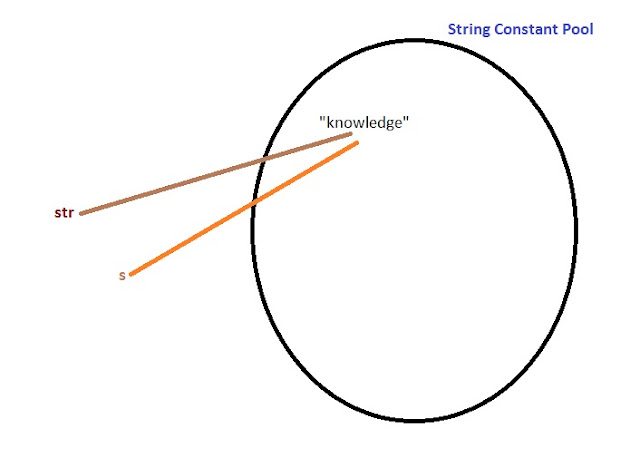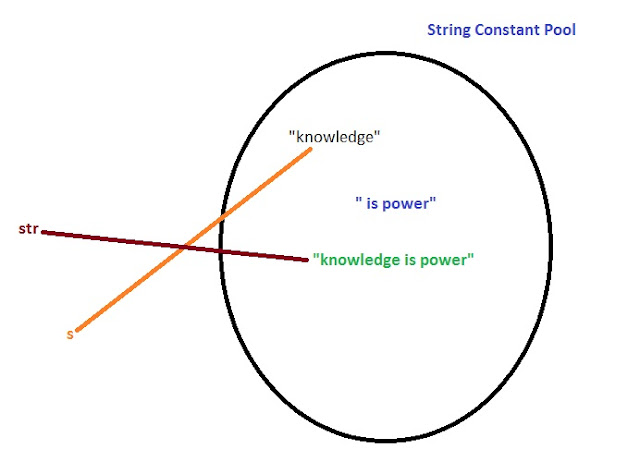An object is considered immutable if its state cannot change after it is constructed.
How to define immutable objects
Make the class final, and don’t provide any methods to modify the fields.
A final class is simply a class that can't be extended and by doing so we make sure that there won't be any subclasses to override the methods.
Another way to do this is by making the constructor private and construct instances in factory methods ( If you make only a private constructor, no class can extend your class, because it can't call the super() constructor )
Why String is immutable?
This is a popular example when talking about Immutability. I had to put a great effort to find a proper example to understand this. Check the example.
To understand this, first, let us create a string
String str = "knowledge";
This creates a string containing "knowledge" and assigns it to reference str. Let's perform some more functions
This creates a string containing "knowledge" and assigns it to reference str. Let's perform some more functions
String s = str; // assigns a new reference to the same string "knowledge"
Let's see how the below statement works:
str = str.concat(" is power");
This appends a string " is power" to str. Since string objects are immutable it doesn't really append. What happens under the hood is, it creates a new string by getting the value of str and " is power". The new string is "knowledge is power". Finally, the JVM assigns this string to str. Now the string constant pool would look like this.
Here, the " is power" string is considered lost because it does not have a reference.
This can be understood more clearly if you look at the source code of "concat()" method of java.lang.String. (Line 29 return a new String)
 |
| String constant pool |
Let's see how the below statement works:
str = str.concat(" is power");
This appends a string " is power" to str. Since string objects are immutable it doesn't really append. What happens under the hood is, it creates a new string by getting the value of str and " is power". The new string is "knowledge is power". Finally, the JVM assigns this string to str. Now the string constant pool would look like this.
 |
| String constant pool |
This can be understood more clearly if you look at the source code of "concat()" method of java.lang.String. (Line 29 return a new String)
String constant pool
String literals could occupy a large area of memory in an Application and String constant pool helps to save memory and make the application efficient.
When the compiler sees a String literal, it looks for the String in the pool. If a match is found, the reference to the new literal is directed to the existing String.
Why exactly string is immutable?
In the String constant pool, string object can have one or more references. Several references could point to the same string.
If several references point to the same String, it would be bad if one of the references modified that String value. That's why String objects are immutable.
Check below example:
It will not be possible to have a String pool if string objects are not immutable in java.
Read Effective Java 3 by Joshua Bloch to get more information. I highly recommend it.
It will not be possible to have a String pool if string objects are not immutable in java.
Minimizing mutability
Java has many immutable classes, including String, the boxed primitive classes, and BigInteger and BigDecimal. These immutable classes are easier to design, implement and use than mutable classes.
- Immutable objects are simple: They can be only in one state in which it was created. But mutable objects can have arbitrary complex states.
- Immutable objects are inherently thread-safe; they require no synchronization: They can not be modified by multiple threads since multiple threads only have read-only access to it (no setters available).
- Immutable objects can be shared freely: Public static final constants for commonly used values reused wherever possible. Static factories can be used to share instances instead of creating new once. Few examples from java.math.BigInteger.
- public static final BigInteger ONE − The BigInteger constant one.
- public static final BigInteger TEN − The BigInteger constant ten.
- public static final BigInteger ZERO − The BigInteger constant zero.
- Immutable objects can share their internals as well: negate method in BigInteger class uses the same array which contains the magnitude when creating the new BigInteger.
/** * Returns a BigInteger whose value is {@code (-this)}. * * @return {@code -this} */ public BigInteger negate() { return new BigInteger(this.mag, -this.signum); }
- Immutable objects make great building blocks for other objects: Immutable objects make great map keys and set elements. What happens if the keys are mutable? check below code.
MyKey key = new MyKey("tic"); //assume hashCode=1234 myHashMap.put(key, "tac"); // Below code will change the key hashCode() and equals() // but it's location is not changed. key.setName("toe"); //assume new hashCode=7890 //below will return null, because HashMap will try to look for key //in the same index as it was stored but since key is mutated, //there will be no match and it will return null. myHashMap.get(new MyKey("tic"));
- Immutable objects provide failure atomicity for free: A failed method invocation should leave the object in the state that it was in prior to the invocation. For example, substring(int) method of String class will create a partial copy of the string and return it, instead of changing the original string.
String str = "www.harshajayamanna.com"; System.out.println("First 4 char String: " + str.substring(0, 4)); //output : First 4 char String: www.
A major disadvantage of immutable objects is that they require a separate object for each operation.Creating these objects can be costly. Classes should be immutable unless there's a very good reason to make them mutable. If a class cannot be made immutable, limit its mutability as much as possible.
Read Effective Java 3 by Joshua Bloch to get more information. I highly recommend it.
References
- https://stackoverflow.com/questions/8798403/string-is-immutable-what-exactly-is-the-meaning
- https://www.mkyong.com/java/java-mutable-and-immutable-objects/
- https://docs.oracle.com/javase/tutorial/java/data/strings.html
- https://www.baeldung.com/java-thread-safety
- https://www.oracle.com/technetwork/java/seccodeguide-139067.html#6
- https://www.amazon.com/Effective-Java-Joshua-Bloch-ebook/dp/B078H61SCH

Comments
Post a Comment